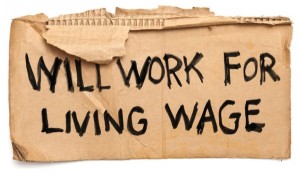
(Image courtesy of http://www.bevanfoundation.org/blog/)
The Living Wage is a brilliant idea. If you pay employees enough to meet the actual cost of living and participate economically in society then it is good for them, good for the business they work for, and good for society. People will be happier. They won’t need to top up subsistence wages with benefits. They’ll be able to buy more goods and services to help fuel the economy.
It’s such a brilliant idea that it has cross-party support. The Prime Minister says it is “an idea whose time has come”. But here’s the problem: he said that 3 years ago and it’s still not Government policy. So why the delay and how do we get the politicians to deliver on their words?
One reason for the delay is that the Government isn’t really prepared to sell the Living Wage to the private sector whose natural instinct is to drive wages down and create worker insecurity. The Coalition could have sold this as the flip-side to their demonisation of people unable to find employment –a ‘beatification of the working man and woman’ if you like, but instead they chose only the demonising bit.
I wanted to understand the situation within the public sector organisations in my workplace. Of all sectors, the public sector should be leading the way on the Living Wage, right? Well, only 25 councils (5%) have adopted the Living Wage, and only the London estates of 3 Government departments (thanks to Valdemar Ventura) have adopted the Living Wage so far. You can see who is signed up here.
Information already in the public domain showed that all the permanent staff in the organisations in the building where I work are paid at or above the Living Wage. As at Feb-13 the lowest paid NHS staff were paid below the Living Wage, but no staff at this grade are based in my building. FOI requests (sent by a friend who worked with me on this issue) found that temporary agency staff employed directly by the Department of Work & Pensions, the Department of Health and NHS England are paid at or above the Living Wage, including the period before their Agency Worker Rights take effect. This was positive news. However, the FOI response (dated Feb-13) from DWP stated:
“Telereal Trillium [the private sector company who maintain the building] have informed us that of the cleaning, catering and security staff based in Leeds, 140 of them are paid less than the Living Wage of £7.45 per hour, but all of them are paid at least the minimum wage.
Currently 15 contractors in the Leeds area, who are employed by Balfour Beatty Workplace (BBW) to carry out post room and office service duties, receive less than the Living wage. The contractor is currently in discussions with Trade Unions for the 2013 pay agreement and consideration of the Living wage will feature in these discussions.”
So confirmation that the budgets of Government departments are being used to pay people below the Living Wage even though all the main political parties are fully signed up to the Living Wage and think it’s an idea whose time came three years ago. We can expect overall Government expenditure on these employees to be higher due to the amount of benefits that they will need to claim than if they were paid the Living Wage.
I took this information to my MP, Hilary Benn, to see if he could influence the situation in any way. He voiced his strong support for the Living Wage and said he would ask a parliamentary question. The question to Mark Hoban (DWP Minister) is published here. It adds little to the FOI information but at least puts the situation on the record and demonstrates to the Minister that the issue is seen as important by the public. It’s not clear whether the post room/office services staff negotiations mentioned in the FOI response were successful or whether these staff were for some reason omitted from Mark Hoban’s reply.
At the same time, Hilary Benn asked Brandon Lewis, Minister at Department for Communities and Local Government a similar question which is published here. Brandon Lewis’ answer is more helpful in some ways than Mark Hoban’s. He says:
“The Government supports the living wage and encourages business to take it up where possible and affordable. However, the decision on what wages to set is for individual employers and workers, and these include agency staff working in the Department.
More broadly, from April 2013, the Government has raised the personal income allowance to £9,440—an income tax cut for 24 million tax payers—which will particularly help those on local incomes. The recent Budget announced the personal allowance will rise again to £10,000 from April 2014.”
Brandon Lewis reiterates the hollow phrase “the Government supports the living wage…” and states quite clearly that his Government are not going to do anything to actually make sure it is implemented, despite the economic and well-being cases. In fact he says that the Government prefers to prop up low pay by use of the tax and benefits system rather than make the “idea whose time has come” reality.
I was thinking about what to do next when Ed Miliband announced his plan to implement the Living Wage should Labour regain power. In a Guardian article here he says that firms could be offered either tax reliefs on training or capital investment, or lower business rates, in return for paying the living wage as a way to boost productivity and cut welfare bills. I’d certainly support this. But people need to keep the pressure on to make sure these are not just more words on the pile.
—————
The campaign site for the Living Wage can be found here. Follow it on twitter @LivingWageUK
Source